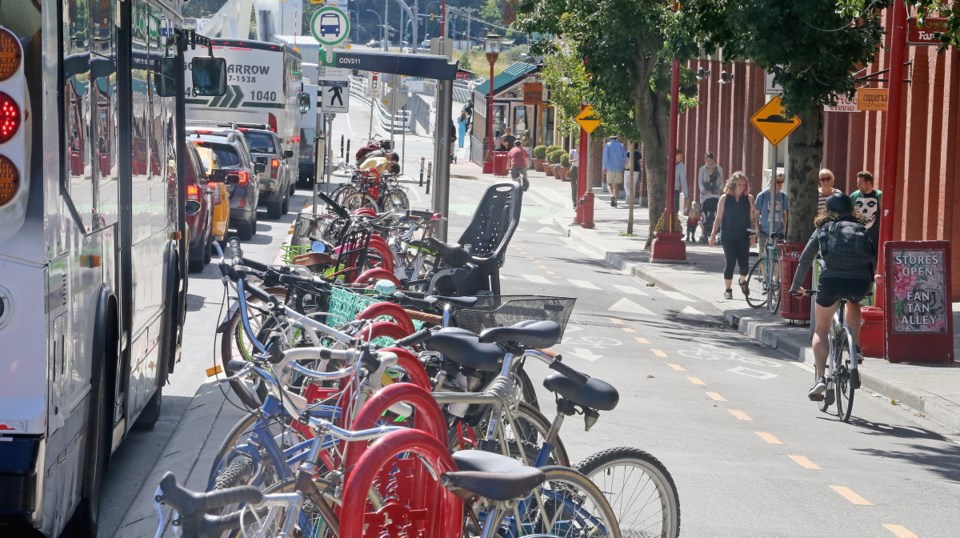The City of Victoria and B.C. Transit have put the lives of blind pedestrians at risk by moving bus stops away from the curb to accommodate bike lanes, claims the Canadian Federation of the Blind.
“It’s a Russian Roulette game,” said Oriano Belusic, 56, who is named in the complaint that the federation is making with the B.C. Human Rights Tribunal against the city and transit, claiming discrimination against the visually impaired.
He cited a close call he had in a bike lane in March.
“Imagine as a blind person getting off the bus. You go around the bus shelter and basically you’re doing Russian Roulette. When you step out into the bike lane there’s a chance, and I’ve certainly had a close call, that you can get whacked by a bike. They don’t stop. They just come sailing through at whatever speed,” Belusic said.
Moving the bus stops to islands jeopardizes the lives of blind people “who must now cross busy bicycle lanes that are used by cyclists whose speed is unregulated and who are not looking out for blind pedestrians,” the complaint says. “Relocating bus stops from the curbside discriminates against blind people by imposing a barrier of fear to accessing previously available public bus transportation. This is a denial of a public service.”
The complaint also alleges that Mayor Lisa Helps admitted in a radio interview that the city’s plans “only consider able-bodied people who can see.”
Helps said she would like to see a transcript and the context of whatever statement is being cited.
“I’ll have to leave comment on the actual engineering to the engineers, but of course we care about people who can’t see. Of course, we care about people who are in wheelchairs. That’s our job as a city,” Helps said.
In designing new infrastructure such as bike lanes, the city is retrofitting infrastructure that historically was built “not at all caring about people with disabilities,” she said.
“But we do have to make sure that the city is accessible for everyone, and that’s been the thrust of my comments on CFAX over and over again. We’re in a challenging situation because we’re retrofitting an old city.”
Belusic reached a settlement agreement with B.C. Transit in 2014 after filing a complaint that the visually impaired were being discriminated against because bus drivers failed to announce all bus stops.
Belusic and lawyer Charles Lugosi, of Crease Harman LLP, say the agreement is not being honoured and might have to be revisited. “More than a third of their drivers are not complying. They’re basically shutting the system off and not living up to their end of the agreement,” Belusic said.
Lugosi said the bike lanes are dangerous to blind pedestrians “who risk their lives to cross the bike lanes just to get on or off the bus.”
Lugosi said the Canadian Federation for the Blind wants to see the bike lanes modified “so at every bus stop buses move to the curb so blind people can get on and off the bus safely.”
“Hopefully, the city will tear up some of those bike lanes to allow the buses to stop at the curbside and they need to rethink their lack of accommodation for those who need accommodation,” Lugosi said.
Neither B.C. Transit or the city had seen a copy of the complaint when contacted for comment.
“Accessibility was taken into consideration in the design process as it is with all city projects,” city spokesman Bill Eisenhauer said in a statement.
“The detailed design work for the bike lanes was completed by a professional engineer and those designs meet all applicable standards and guidelines.”
Eisenhauer said the city would be “happy to talk to the group to discuss any concerns or suggestions they have for improvements.”
He said there was “very close consultation” with B.C. Transit in the design of the bike lanes.
Transit spokesman Jonathon Dyck said transit had not seen the complaint and final decisions about design of infrastructure is with the local government.
If the automated system to announce stops on buses is not working, transit expects drivers to call out stops, he said.
New technology, to be introduced by the end of this winter, will have automated announcements and visual displays of upcoming stops. “That will help improve accessibility on our buses,” he said.



